
The Divine Mercy Novena Prayer is a powerful nine-day devotion revealed to Saint Faustina, starting on Good Friday․ It emphasizes God’s infinite mercy and forgiveness, encouraging believers to pray for the salvation of all souls․ Each day focuses on specific intentions, accompanied by the Chaplet of Divine Mercy, a prayer of love and trust in God’s mercy․ This devotion is deeply rooted in Catholic tradition and offers spiritual renewal and healing․
Overview of the Divine Mercy Devotion
The Divine Mercy Devotion is a Catholic devotion rooted in the revelations of Saint Faustina Kowalska, emphasizing God’s infinite mercy and love for humanity․ It encourages trust in God’s mercy, especially for sinners, and promotes acts of mercy, prayer, and forgiveness․ Central to the devotion are the Chaplet of Divine Mercy, the Novena, and the Feast of Divine Mercy on the first Sunday after Easter․ These practices aim to bring souls closer to Christ, seeking His mercy and grace for the world․ The devotion has become a powerful worldwide movement, inspiring spiritual renewal and healing․
Significance of the Novena in the Divine Mercy Devotion
The Divine Mercy Novena holds profound significance as a nine-day prayer vigil leading to Divine Mercy Sunday․ Revealed to Saint Faustina, it emphasizes prayer for the salvation of souls, with each day dedicated to a specific group, such as sinners, the faithful, and the departed․ The Novena deepens trust in God’s mercy and fosters a spirit of forgiveness and compassion․ By immersing souls in Christ’s mercy, it prepares hearts for the Feast of Divine Mercy, offering spiritual healing and renewal․ This devotion is a powerful way to seek divine grace and intercede for the world․

The Origin and History of the Divine Mercy Novena
The Divine Mercy Novena originated from revelations given by Jesus to Saint Faustina Kowalska in the 1930s․ It began on Good Friday and concluded on Divine Mercy Sunday, emphasizing God’s mercy and forgiveness․ The novena spread globally after Saint Faustina’s death, becoming a cornerstone of the Divine Mercy devotion․ Its roots are deeply tied to her spiritual diary, which details the prayers and intentions Jesus entrusted to her․ This sacred tradition continues to inspire millions worldwide․
Role of Saint Faustina Kowalska in the Divine Mercy Devotion
Saint Faustina Kowalska, a Polish nun, is the cornerstone of the Divine Mercy Devotion․ Jesus revealed the message of His mercy to her, instructing her to spread it worldwide․ Through her diary, Divine Mercy in My Soul, she recorded the prayers, including the Divine Mercy Novena and the Chaplet of Divine Mercy․ Faustina’s role was to be the messenger of God’s mercy, emphasizing trust in His compassion and forgiveness․ Her revelations led to the establishment of the Feast of Divine Mercy and the widespread practice of the novena․ Her canonization in 2000 further solidified her importance in the Catholic Church․
Revelations from the Diary of Saint Faustina
Saint Faustina’s diary, Divine Mercy in My Soul, contains profound revelations about God’s mercy․ Jesus entrusted her with the mission to spread this message, emphasizing trust in His compassion․ The diary details the Divine Mercy Novena, which Jesus instructed her to pray starting on Good Friday․ Faustina recorded specific intentions for each day, along with prayers for various groups of souls․ Her writings also include the Chaplet of Divine Mercy and the promise of abundant graces for those who pray it․ These revelations have become the foundation of the Divine Mercy devotion, guiding believers to seek forgiveness and share God’s mercy with others․
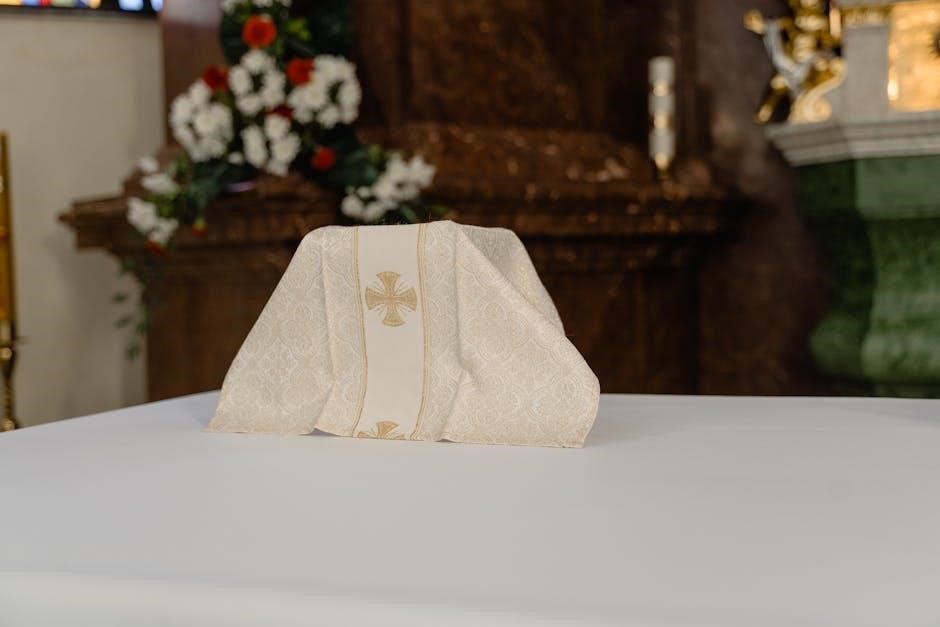
Structure of the Divine Mercy Novena
The Divine Mercy Novena is a nine-day prayer devotion starting on Good Friday․ Each day includes praying the Chaplet of Divine Mercy and specific intentions for various groups, as revealed by Jesus to Saint Faustina․ This structured approach helps believers focus on God’s mercy and seek forgiveness․
Starting the Novena on Good Friday
The Divine Mercy Novena begins on Good Friday, as instructed by Jesus to Saint Faustina․ This nine-day prayer devotion leads up to Divine Mercy Sunday, emphasizing God’s mercy and forgiveness․ The novena starts with a specific intention each day, as revealed in Saint Faustina’s diary, focusing on different groups of souls․ Praying the Chaplet of Divine Mercy daily is central to the novena, with optional opening and closing prayers․ Starting on Good Friday aligns the devotion with the Passion of Christ, highlighting the connection between His sacrifice and the outpouring of divine mercy․ This period of prayer prepares believers to celebrate God’s infinite love and forgiveness on Divine Mercy Sunday․
Praying the Chaplet of Divine Mercy
The Chaplet of Divine Mercy is a central prayer in the novena, typically prayed on rosary beads․ It begins with the Our Father, Hail Mary, and Apostles’ Creed, followed by the Divine Mercy prayer repeated ten times․ The Chaplet is a powerful way to implore God’s mercy for oneself and others․ Optional opening and closing prayers, such as the “Eternal Father” and “Holy God,” enhance the devotion․ Praying the Chaplet daily during the novena fosters a deeper connection to Christ’s mercy and compassion, aligning with the teachings of Saint Faustina․ It is a simple yet profound way to seek forgiveness and grace․
Daily Intentions and Prayers for Each Day
The Divine Mercy Novena includes specific daily intentions and prayers, each focusing on different groups of souls․ Day one begins with prayers for all mankind, especially sinners, immersing them in God’s mercy․ Subsequent days target souls of the faithful, priests, religious, the meek, those who glorify God, the sorrowful, the lukewarm, and finally, the souls in purgatory․ Each day’s prayer is paired with the Chaplet of Divine Mercy, fostering a spiritual journey of intercession and trust in God’s compassion․ This structured approach ensures comprehensive coverage of all souls, reflecting Jesus’ desire for universal salvation․

Key Prayers and Devotions in the Novena

The Divine Mercy Novena features core prayers like the Chaplet of Divine Mercy, Eternal Father prayer, and Closing Prayers, emphasizing trust in God’s mercy and compassion for all souls․
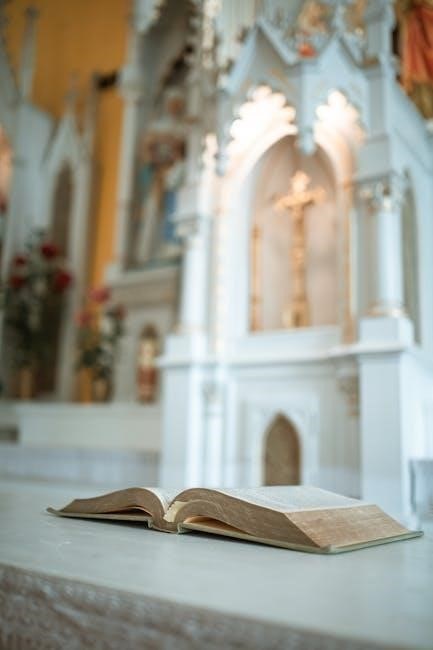
The Optional Opening Prayers
The Optional Opening Prayers of the Divine Mercy Novena are a beautiful way to prepare one’s heart for the devotion․ These prayers, such as “You expired, Jesus, but the source of life gushed forth for souls,” and “O Fount of Life, unfathomable Divine Mercy,” are taken from Saint Faustina’s diary․ They invoke God’s mercy and grace, setting the tone for the nine-day prayer․ These prayers are recited before the Chaplet of Divine Mercy and are meant to deepen one’s trust in God’s infinite compassion․ They are optional but highly recommended to enrich the novena experience․
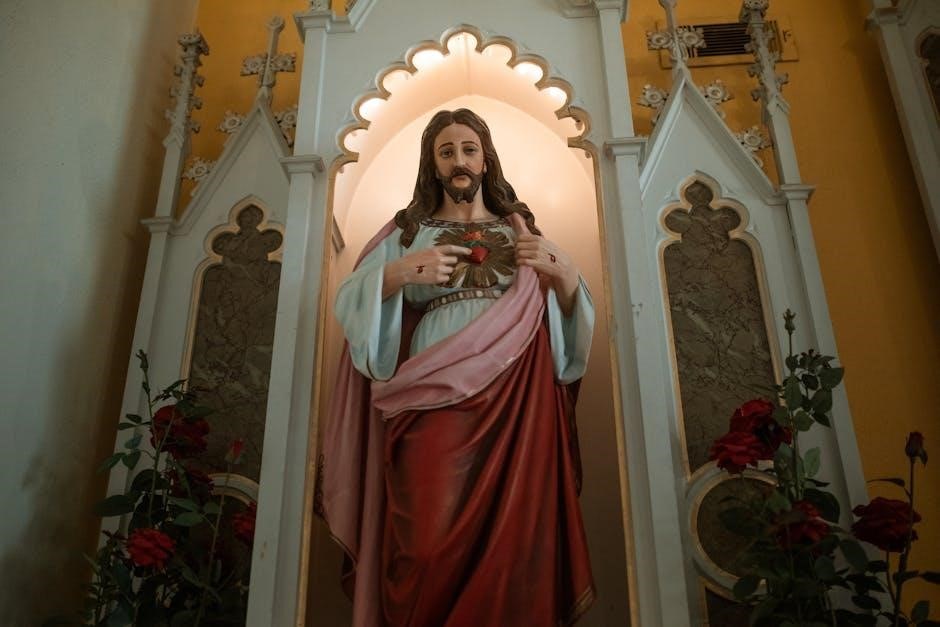
The Eternal Father Prayer
The Eternal Father Prayer is a profound part of the Divine Mercy Chaplet, recited daily during the novena․ It begins with an Our Father, Hail Mary, and the Apostles’ Creed, followed by the prayer: “Eternal Father, I offer You the Body and Blood, Soul and Divinity of Your dearly beloved Son, Our Lord Jesus Christ, in atonement for our sins and those of the whole world․” This prayer, revealed to Saint Faustina, emphasizes sacrifice and mercy, pleading for forgiveness and grace for all humanity․ It is a powerful expression of trust in God’s boundless compassion and His ability to transform hearts․
Closing Prayers of the Chaplet
The Closing Prayers of the Chaplet of Divine Mercy serve as a heartfelt conclusion to the devotion․ After reciting the Chaplet, the optional closing prayer is offered: “Holy God, Holy Mighty One, Holy Immortal One, have mercy on us and on the whole world․” This prayer is repeated three times, emphasizing trust in God’s mercy․ An additional prayer may follow: “Eternal God, in whom mercy is endless and the treasury of compassion inexhaustible, look kindly upon us and increase Your mercy in us, that in difficult times we may not faint in trusting You․” These prayers, rooted in Saint Faustina’s revelations, express deep reliance on God’s forgiveness and grace․

The Feast of Divine Mercy and Its Celebration
The Feast of Divine Mercy is celebrated on the first Sunday after Easter, emphasizing God’s boundless mercy and forgiveness․ It concludes the Divine Mercy Novena, with required acts of mercy, Mass, Confession, and Communion․ This day invites believers to trust in God’s infinite love and seek His grace․
Preparation for Divine Mercy Sunday
Preparation for Divine Mercy Sunday involves a nine-day novena starting on Good Friday, focusing on specific intentions each day․ Believers are encouraged to pray the Chaplet of Divine Mercy, reflect on Saint Faustina’s diary, and perform acts of mercy․ Sacramental confession and Holy Communion are essential parts of the preparation, fostering spiritual renewal․ The novena culminates on Divine Mercy Sunday, where followers celebrate God’s infinite mercy with prayer services, veneration of the Divine Mercy image, and acts of compassion․ This preparation deepens faith and trust in God’s boundless love and forgiveness․
Required Acts of Mercy on the Feast Day
On the Feast of Divine Mercy Sunday, believers are called to perform acts of mercy, reflecting God’s compassion․ These include feeding the hungry, giving drink to the thirsty, sheltering the homeless, and visiting the sick․ Additionally, burying the dead and praying for both the living and the deceased are encouraged․ These acts embody the teachings of Saint Faustina and emphasize the importance of showing mercy to others․ By fulfilling these works, individuals align themselves with the divine mercy devotion, seeking to mirror God’s love and forgiveness in their actions․ This day serves as a powerful reminder of the transformative power of mercy․
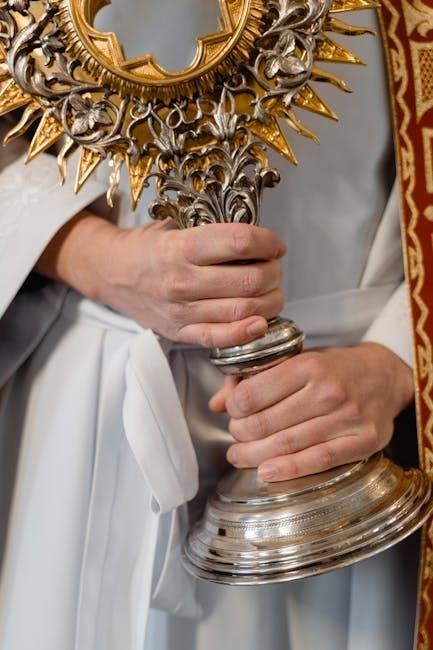
Benefits of Praying the Divine Mercy Novena
Praying the Divine Mercy Novena brings spiritual healing, forgiveness, and strength; It offers intercession for souls and the world, promising abundant graces and mercy․
Spiritual Healing and Forgiveness
The Divine Mercy Novena offers profound spiritual healing and forgiveness, renewing hearts and deepening trust in God’s mercy․ Through daily prayers and the Chaplet, believers experience consolation and peace․ Jesus promised that those who pray the novena would receive abundant graces and relief from suffering․ The novena’s focus on mercy and compassion fosters spiritual renewal, helping to heal emotional wounds and restore faith․ It is a powerful devotion for seeking forgiveness and interceding for others, emphasizing God’s infinite love and pardon for all humanity․ This prayer tradition continues to transform lives, offering hope and divine comfort․
Intercession for Souls and the World
The Divine Mercy Novena is a powerful means of intercession, prayed for the salvation of souls and the needs of the world․ Each day focuses on specific groups, such as sinners, the faithful, and those in purgatory․ By praying the Chaplet and novena, believers intercede for the conversion of hearts and the outpouring of God’s mercy globally․ This devotion emphasizes Jesus’ desire to pour out His mercy on all humanity, offering hope for a world in need of healing and unity․ Through this prayer, the faithful become vessels of divine compassion, seeking God’s grace for all․
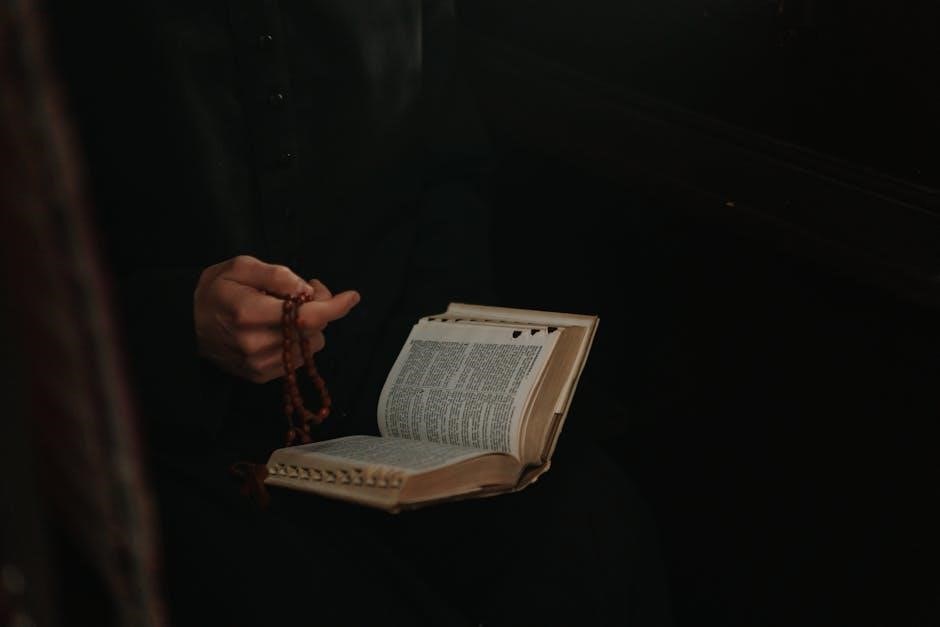
Downloading and Using the Divine Mercy Novena PDF
The Divine Mercy Novena PDF is readily available online, offering the Chaplet and daily intentions․ It provides clear guidelines for printing and sharing the prayers widely․
Availability of the Novena Prayer PDF
The Divine Mercy Novena Prayer PDF is widely available online, offering the complete Chaplet and daily intentions․ It can be downloaded from various Catholic websites, such as EWTN or the National Shrine of the Divine Mercy․ The PDF includes optional opening and closing prayers, making it easy to follow the devotion․ This resource serves as a practical guide for believers, ensuring they can participate fully in the nine-day prayer․ Additionally, it often includes excerpts from Saint Faustina’s diary, enriching the spiritual experience․ The PDF is a convenient tool for those seeking to deepen their faith and prepare for Divine Mercy Sunday․
Guidelines for Printing and Sharing the PDF
The Divine Mercy Novena Prayer PDF is designed for easy printing and sharing․ To ensure clarity, print the document on standard letter-sized paper, preferably in duplex mode to save resources․ Share physical copies at churches, prayer groups, or community centers․ Digitally, distribute the PDF via email, social media, or messaging platforms․ When sharing, always credit the original source to respect copyright․ Encourage others to download and pray along, spreading the message of mercy․ This helps in fulfilling Jesus’ request to share His mercy with the world, as revealed to Saint Faustina․
Embrace the transformative power of the Divine Mercy Novena and invite others to join in prayer․ Begin today, trusting in Jesus’ promise of mercy and healing for all souls․
Encouragement to Begin the Novena
Embark on the Divine Mercy Novena with an open heart, trusting in Jesus’ promises of forgiveness and healing․ This sacred devotion, rooted in Saint Faustina’s revelations, offers a profound encounter with God’s mercy․ Each day’s prayer, guided by specific intentions, invites spiritual renewal and deeper trust in His love․ Whether prayed individually or with others, the novena’s structure and simplicity make it accessible to all․ Begin with confidence, knowing that Jesus’ mercy is limitless and available to every soul․ Let this journey transform your life and draw you closer to His divine embrace․
Final Blessings and Prayers for Those Participating
As you complete the Divine Mercy Novena, may God’s abundant blessings rest upon you․ Pray the Eternal Father prayer, seeking strength and renewal․ Offer the Closing Prayers of the Chaplet, imploring mercy for yourself and the world․ Trust in Jesus’ promise that those who pray this novena will be immersed in His mercy․ Conclude with heartfelt gratitude, asking for the grace to live according to His will․ May Saint Faustina’s intercession guide you, and may the Divine Mercy remain a source of comfort and hope in your life․ Amen․
